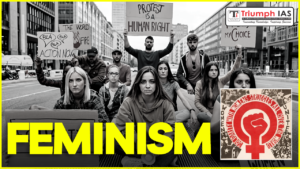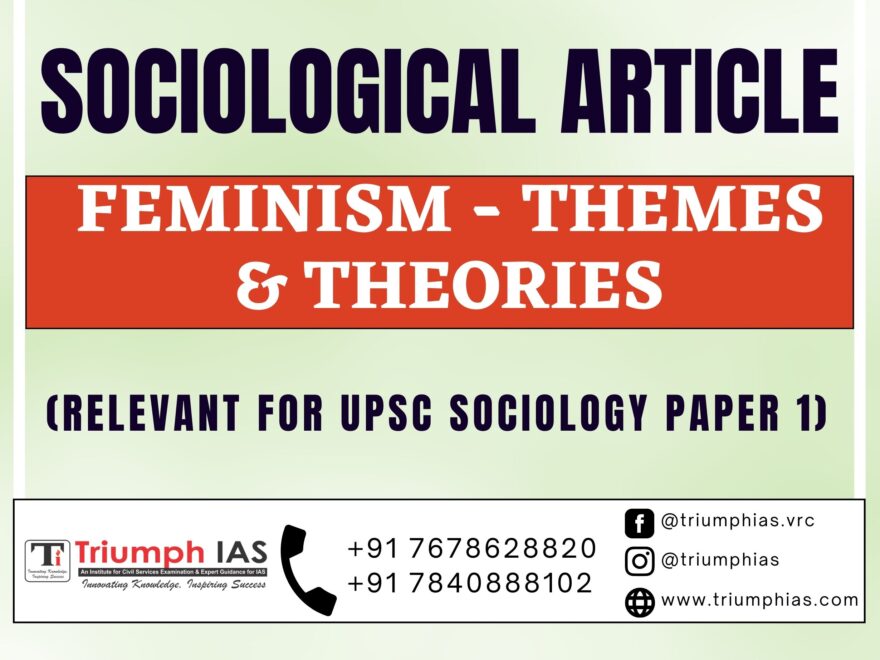FEMINISM – THEMES & THEORIES
(Relevant for UPSC Sociology Paper 1)

Introduction: Feminism is a complex and multifaceted movement that has evolved over time to encompass a broad range of themes and theories. At its core, feminism seeks to address gender inequality and promote equal rights and opportunities for individuals of all genders. In this blog post, we will explore the themes and theories of feminism, from its historical roots to its contemporary expressions.
HISTORICAL ROOTS OF FEMINISM
The roots of feminism can be traced back to the 19th century, when women began to organize and mobilize for their rights. The first wave of feminism, which began in the late 19th century and lasted until the early 20th century, focused on securing legal and political rights for women, such as the right to vote.
The second wave of feminism, which emerged in the 1960s and 1970s, expanded the scope of feminist activism to address a wider range of issues, including reproductive rights, workplace discrimination, and violence against women. The second wave also included a diverse range of feminist theories, including liberal feminism, socialist feminism, and radical feminism.
THEMES OF FEMINISM
Feminism encompasses a broad range of themes, each of which seeks to address different aspects of gender inequality. Some of the key themes of feminism include:
Patriarchy: Patriarchy is a term used to describe a system of social organization in which men hold the primary power and authority. Feminists argue that patriarchal structures perpetuate gender inequality by prioritizing male perspectives and interests, and that dismantling these structures is necessary to achieve gender equality.
Reproductive Rights: Reproductive rights are a key focus of feminist activism, and include issues such as access to contraception and abortion, as well as the right to choose whether or not to have children. Feminists argue that reproductive rights are essential for women’s autonomy and self-determination.
Violence Against Women: Feminists also focus on the issue of violence against women, including sexual assault, domestic violence, and trafficking. Feminists argue that these forms of violence are rooted in gender inequality and are a systemic problem that requires systemic solutions.
Gender Identity: Gender identity is another key theme in contemporary feminist thought, which recognizes that gender is not a binary, but rather a spectrum. Feminists argue that individuals should be able to express their gender identity without fear of discrimination or violence, and that society should recognize and respect a diversity of gender identities.
THEORIES OF FEMINISM
Feminism encompasses a wide range of theories, each of which seeks to understand and address gender inequality in different ways. Some of the key feminist theories include:
Cultural Feminism: Cultural feminism is a political and philosophical movement that emerged in the 1960s and 1970s as an offshoot of feminism. It emphasizes the importance of celebrating women’s differences and recognizing the unique contributions that women make to society and culture.
Cultural feminists view gender differences as positive and valuable, and argue that they should be celebrated rather than erased or minimized. They emphasize the importance of valuing women’s traditional roles as caregivers and nurturers, and of recognizing the unique qualities that women bring to social and political life.
Postmodern Feminism: Postmodern feminism is a theory that challenges the idea of a universal, essentialized womanhood. Postmodern feminists argue that gender is a social construct that varies across time and place, and that feminist activism should focus on destabilizing gender norms and categories.
Black Feminism: Black feminism is a theory that seeks to address the ways in which race and gender intersect to create unique forms of oppression for black women. Black feminists argue that mainstream feminist theory often ignores the experiences of women of color, and that a more intersectional approach is necessary to achieve true gender equality.
Trans Feminism: Trans feminism is a theory that centers the experiences and perspectives of trans individuals in feminist discourse. Trans feminists argue that traditional feminist theory often excludes or erases trans experiences, and that a more inclusive approach is necessary to achieve gender equality for all individuals.
CONCLUSION
Feminism is a complex and multifaceted movement that has evolved over time to encompass a broad range of themes and theories. From its historical roots in the fight for women’s suffrage to its contemporary expressions focused on intersectionality, reproductive rights, violence against women, gender identity, and more, feminism has sought to address gender inequality in all its forms. The theories of feminism, including liberal feminism, socialist feminism, radical feminism, postmodern feminism, black feminism, and trans feminism, offer different perspectives on how to achieve gender equality, but all share the common goal of promoting equal rights and opportunities for individuals of all genders. As we continue to strive for a more just and equitable world, feminist theory and activism will undoubtedly play a critical role in shaping the future of gender relations.
-
Follow us :
🔎 https://www.instagram.com/triumphias
🔎https://www.youtube.com/c/TriumphIAS
https://t.me/VikashRanjanSociology
Find More Blogs
Scope of the subject and comparison with other social sciences
Changing family structure in India Modernity and social changes in Europe
UPSC Sociology Syllabus, Major Theoretical Strands of Research Methodology, feminism, racism, sexism, ableism, homophobia, Kimberlé Crenshaw, policy, activism, identity politics, class, capitalism, intersectional feminism, social identities, systems of oppression, marginalized communities, privilege,#Sociologyforupsc #sociologyforupscinhindi #sociologyforupscgs1 #sociologyforupscprelims #sociologyforupscinenglish #sociologyforupscmainsinhindi #sociologyforupscoptionalinhindi #sociologyforupscmains #sociologyforupscplaylist #sociologyforupsclecture1 #sociologyforupsccse #sociologyforupscoptional #syllabusofsociologyforupscoptional #bestbookforsociologyforupsc #sociologyoptionalforupscanswerwriting #sociologyoptionalforupscanukumari #sociologyoptionalforupscabhijeet #sociologyoptionalforupscanalysis #sociologyoptionalforupscalllectures #sociologysyllabusforupscanalysis

